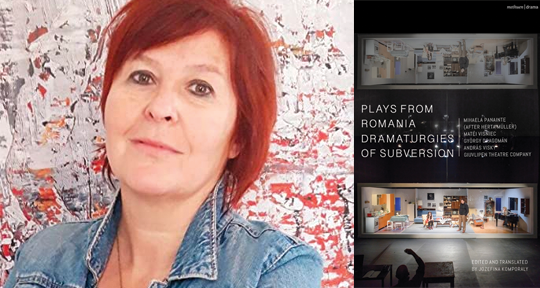Plays from Romania: Dramaturgies of Subversion, edited and translated by Jozefina Komporaly, Bloomsbury Methuen Drama, 2021
In the pretentiously Francophone Bucharest of the late nineteenth century, Ion Luca Caragiale’s plays were met with harsh criticism for their alleged sexual innuendos and outrageous immorality—what one might nowadays call subversion. Caragiale, whose reputation has now grown into that of an unparalleled classic and a quintessential influence on a host of Romanian/international avant-garde luminaries, was in fact of mixed Balkan heritages. He spent his later years as an émigré in Berlin, thus proving himself an ambivalent maverick and avant-la-lettre transnational.
Almost 150 years on, Romanian drama boastfully continues this legacy of subversiveness, diversity, and transnationalism. In that respect, the best possible illustration of such variation is the recent anthology, Plays from Romania: Dramaturgies of Subversion, edited and translated by Jozefina Komporaly. From the very introduction, Komporaly pertinently places contemporary Romanian theatre at the crossroads of the culture’s emergence from communism thirty years ago, and situates its ever increasing representation of minorities—particularly Roma—in a global context. The very rich and nuanced landscape that Komporaly aptly charts is further complicated by the dualism of state-funded (more traditional) and independent (more avant-garde) theaters, as well as formal genre-related features—both text-based and experiment/performance-informed. The picture is then rendered even murkier by companies specializing in minority drama and/or being run by representatives of minorities striving to gain state-funded status.
While informed therefore by a knowledgeable historical and cultural perspective, the anthology’s aim—as stated by Komporaly—is mainly to feature the country’s formal literary and cultural diversity by illustrating the common grounds of “burning concerns rooted in Romanian realities” and the experiments “push[ing] the boundaries of the genre.” And indeed, unconventional approaches are featured from the very opening play: a stage adaptation by Mihaela Panainte of Noble Prize winner Herta Müller’s short story collection, Lowlands (thus forging a connection to the German minority in Romania). Panainte’s staging of Müller’s fiction rivetingly captures the latter’s poetic fragmentariness through what Komporaly rightly calls textual modularity—just as the translator herself lithely renders that same combination of poetry and alert colloquialism alongside a more ponderous social grayness and a haunting sense of death’s ubiquity. READ MORE…

